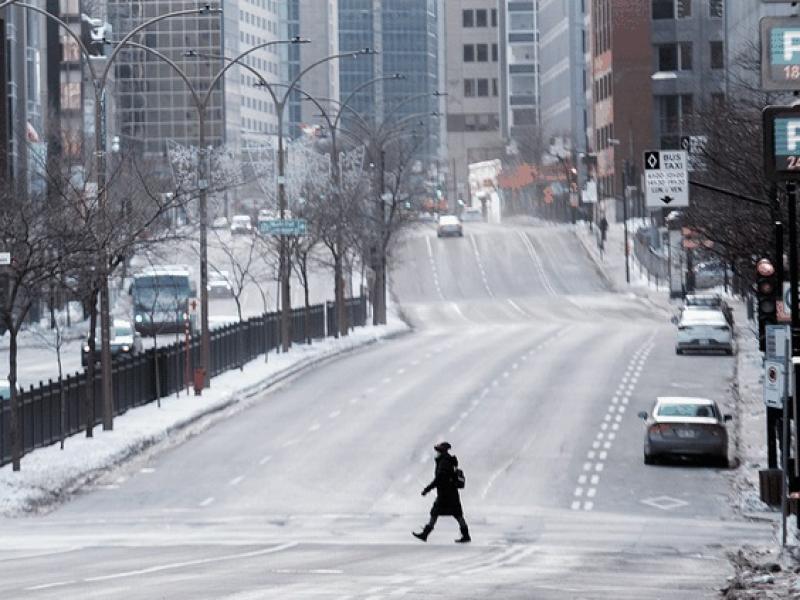Scientists criticize flaws in study that found lockdowns do little to reduce COVID deaths



Following a Johns Hopkins University study showing that lockdowns only curbed COVID deaths by 0.2 per cent, some scientists are criticizi“Smoking causes cancer, the earth is round, and ordering people to stay at home … decreases disease transmission.
A study purporting to prove the opposite is almost certain to be fundamentally flawed,” reads a critique by the University of Oxford’s Seth Flaxman, the lead author on a 2020 study which estimated that lockdowns had likely saved up to three million lives across Europe.ng the report as fundamentally flawed.
The Johns Hopkins paper in question is a pre-print meta-analysis of 34 prior studies examining the link between lockdowns and COVID mortality. Its authors ultimately conclude that lockdowns have “little to no public health effects” and should be “rejected out of hand as a pandemic policy instrument.”
Flaxman was among four prominent public health researchers who criticized the study in a Thursday post published by the Science Media Centre, a U.K. non-profit that works as a conduit between scientists and the media.
One of the other critiques was drafted by Neil Ferguson, an epidemiologist at the U.K.’s Imperial College London whose early modelling on COVID-19 was influential in driving the first major waves of pandemic lockdowns.
The U.K. had initially intended minor interventions on COVID-19, until persuaded otherwise by research from Ferguson’s COVID-19 Response Team, which claimed that a hands-off strategy could yield “hundreds of thousands of deaths.”
“Suppression will minimally require a combination of social distancing of the entire population, home isolation of cases and household quarantine of their family members,” said the March 2020 paper.
Throughout the pandemic, most COVID research out of Johns Hopkins University has typically come from its Coronavirus Resource Center, an initiative run out the university’s world-renowned medical school.
But the new paper, which was drafted by three economists, comes out of the university’s unaffiliated Krieger School of Arts and Sciences.
The economists — who were led by Denmark’s Jonas Herby — only sought data on COVID mortality, and ignored the effects of pandemic strictures on other factors such as hospitalizations or overall case rates. They also excluded any study whose accounting of lives saved was based on forecasts.
Most notably, this included the aforementioned Flaxman study which calculated that lockdowns saved three million European lives (that study also counted Ferguson as a co-author).
As the Johns Hopkins authors wrote, the Flaxman study assumed the “pandemic would follow an epidemiological curve unless countries locked down.” In doing so, they argue, the study took the view that “lockdowns are the only thing that matters” and ignored peripheral factors such as seasonal changes.
One of Ferguson’s primary criticisms of the Johns Hopkins study was that it painted the term “lockdown” with too broad a brush.
The Johns Hopkins study defined a lockdown as “the imposition of at least one compulsory, non-pharmaceutical intervention.” Under this metric, a country whose only COVID stricture is a five-day mandatory quarantine is treated exactly the same as a country experiencing curfews and blanket closures on public venues.
A theme taken up by all the critics in the Science Media Centre post was that the Johns Hopkins meta-analysis failed to account for instances in which a lockdown may have arrested the growth rate of deaths, if not the raw number of deaths themselves. “Many countries locked down before seeing exponential growth and therefore saw no reduction in deaths,” wrote Samir Bhatt, an Imperial College London statistician who was directly involved with the COVID-19 response in New York State.
A report in Forbes wrote that all three authors of the Johns Hopkins paper are definitively of the “free market” bent. Herby works for the libertarian-leaning Center for Political Studies in Copenhagen.
Easily the most famous author is Steve Hanke, a renowned currency researcher who has certainly made no secret of his opinion on lockdowns. Just last week, he posted a cartoon to Twitter showing a semi-truck about to crush an effigy of Prime Minister Justin Trudeau dressed up as Adolf Hitler.
“Trudeau’s political overreach and endless lockdowns have pushed the Canadian public to the boiling point,” he wrote.
The Johns Hopkins paper has thus far received minimal mainstream media attention, and has been cited mostly by right-leaning outlets such as the Daily Mail, Fox News and the National Review.
On Wednesday, a Johns Hopkins professor of surgery, Martin Makary, was accusing his own employer of downplaying the study.
“Johns Hopkins itself did not even put out a press release about this study, and if you look at the media coverage, it’s one of the biggest stories in the world today, and yet certain media outlets have not even covered it,” Makary told Fox News host Tucker Carlson.
Tags
Who is online
330 visitors

"Throughout the pandemic, most COVID research out of Johns Hopkins University has typically come from its Coronavirus Resource Center, an initiative run out the university’s world-renowned medical school."
But the new paper, which was drafted by three economists, comes out of the university’s unaffiliated Krieger School of Arts and Sciences.
Someone posted a different 'article' about this - I didn't think about it at the time - but it's those three economists analyzing the data - THANKS FOR THE CONFIRMATION HALLUX. I had a feeling there was something hinky about that 'article'.
And the National Post is our version of FOX ... so go figure.
damn, 3 economists did a study on the economic effects of lockouts!
Why, those bastards should be hung!
While that may be true I don't see where they successfully refuted the conclusion. They seem to talk about a few things that the study did not include but didn't actually prove that the conclusion they were trying to prove, based on their definitions and parameters, was not true. Also the fact that someone that had an issue with it was someone that had said the lockdowns have saved millions of lives before. Maybe a little self serving to knock this one down.
In any case the study is an interesting read but like most studies must be taken with a grain of salt, as should the response to it.
I expect that any knock down if one is to come will take several months, academics are not known for speed and agility. As is noted in the 'Hopkins' study, the researchers 'cherry picked' all but 34 studies out of 18,590. Having been an academic I can attest that 99% of them have a strong dislike for the other 99%.
I find that hard to believe.
So...what does the study say...precisely?
I'd rather hear you precise take on a study some 60+ pages long plus the other 34 used to support it which I presume will be of equal length.
So you don't know what it says...
Do your own homework for once
First of all, why are 'economists' doing a report on something medical?
Second, there is no way in hell you could tell me that staying away from people that are infected does no good.
Personally I would like to see a study on the different states and how the different ways of handling covid really made a difference in results at the end of this. Did the lock downs help or just delay the inevitable. Remember this all started with 2 weeks to flatten the curve and then it seems the goal posts have been moving ever since. Time will tell, there is no way to make a conclusion yet.
It is just common sense. Stay away from infected people as to not infect yourself.
When there is no way to tell who is carrying the virus and who is not Imo it was the right call.
I am not saying it is not effective at all but how effective it actually is/was and is it really that different from places that did not shut down. Even those goal posts changed as I seem to recall, 3 feet to 6 feet and then back, depending on the strain. Anyone that wanted to stay away from others should do that, but shutting down a country may be a little drastic. I would still like to see a study as to how effective it was in the overall country based on shutdown rules. And not just a snapshot but the total time from start to end.
Rest assured they are going to be doing one, but it's going to take years just to collect all the data parse that data remove all the false data (people who died from other than covid causes) and come to any conclusions....
I doubt if they will ever come to any conclusive determination...
I hope so, and I hope they keep the politicians away from it. Anything we can learn will help us the next time we run into this. I hardly believe this is the last pandemic we will be seeing.
The study is full of holes and is certainly not an accurate representation of 'lockdowns', as it says "Under this metric, a country whose only COVID stricture is a five-day mandatory quarantine is treated exactly the same as a country experiencing curfews and blanket closures on public venues."
So to their study countries that simply required those diagnosed with Covid to stay home for 5 days would be considered a "lockdown" which is frankly ridiculous.
It also points out “Many countries locked down before seeing exponential growth and therefore saw no reduction in deaths,”. So clearly anyone trying to push the Johns Hopkins University study as proof lockdowns are pointless are either deeply deluded and confused or intentionally trying to mislead people.
Well look here. Much ado about nothing......................from the study.
In other words lockdowns won't stop it.
E C O N O M I C I M P A C T
https://sites.krieger.jhu.edu/iae/files/2022/01/A-Literature-Review-and-Meta-Analysis-of-the-Effects-of-Lockdowns-on-COVID-19-Mortality.pdf?fbclid=IwAR0Pv5frFI0wy6P_2yJfVcRyVwUS88DgPM-mBCsz9fXLx8B9lDIxdIs11kw
Citing something from the same study by the economists not affiliated with JHU doesn't mean dick
claiming something is false without proof doesn't mean dick either.
[deleted]
Its true-- neither Masdks nor nor lockdowns, nor vaccines do anything to stop Covid.
While many Liberals don't know that, many Right-wingers (and especdially the most ardent Trump cultists) are aware of that.
They won't get vaccinated-- oppose shut-downs-- even social distancing-- and refuse to wear masks.
But is that a bad thing?
Why are so many liberals trying to change their mind?
After all, over time-- that may be a good thing, eh ..????
Some are drinking their own urine. I encourage them to drink all their urine
"Scientists Criticize Flaws In Study That Found Lockdowns Do Little To Reduce COVID Deaths"
As they should. Lockdowns sure as hell worked where I live, but then the population here was smart enough to do it immediately, and they didn't wait until the virus was already spreading, nor did they reopen too soon. It takes unselfish people who are more concerned about the wellbeing of their families and the good of the community rather than.....well, I really don't have to say it again and again, do I.
Lot's of bagging on the study here Buzz. Not necessarily by you, but I'm leaving this here, because, ironically enough, the authors of the maligned study apparently agree with you.